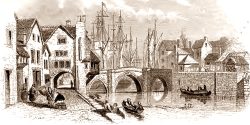This volume was published in 1805
BRIDGEWATER is a large, populous borough, and market town of Somersetshire, England, seated on the river Parret, which winds in a bold stream hence towards the estuary of the Bristol channel. The town is situated in a flat and rather woody country, having rich moors to the north and east. It was formerly of much greater importance than at present, as it has suffered material injury by means of conflagrations, and various vicissitudes of warfare; particularly in 1645, when the town was besieged by the parliament’s army under the command of Sir Thomas Fairfax, who committed great devastations.
The markets are on Thursdays and Saturdays; and for the accommodation of those who frequent them, a spacious and convenient market-house has been lately erected. There are also four annual fairs. Bridgewater is a very ancient corporation, governed by a mayor, recorder, two aldermen, and twenty four-common-councilmen. The town was formerly protected by a castle, the greater part of which was demolished during the civil wars. It was in the castle yard, or castle fields at Bridgewater, that the duke of Monmouth encamped his raw and undisciplined troops, previously to his battle on Sedgemoor, where he was defeated. The castle and manor were formerly held by the queens of England. The corporation have also their peculiar manor within the town. The church dedicated to St. Mary is a large handsome structure, with a tower and spire at the west end. A very fine altar piece was given by the Hon. Anne Powlett. Here was formerly an ancient hospital founded by William Briwere in the time of Henry III., but not a vestige of it remains. Bridgewater sends two members to parliament; and the right of voting is vested in the inhabitant householders paying scot and lot. The revenues of the corporation, consisting of the manor of the borough, the great and small tythes, with some manors in Dorsetshire, are valued at 5000l. per annum. The authority of the magistrates extends throughout the parish, and the corporation are conservators of the river Parret. The burgesses are free in all parts of the united kingdom, except London and Dublin; and the sheriff Somersetshire cannot send any process into the borough, it having been made a county within itself by Henry VIII. It was made a free borough by king John, a mayor town by Henry IV. and sent to parliament 23d Edward I. This borough was formerly under the patronage of the celebrated Bubb Doddington, and has been the object of strong contest in different elections. The Midsummer county sessions are constantly held here; and the assizes every other year.
At the port the manufactures of Manchester, Liverpool, Birmingham, &c. are landed for the use of the western counties. The duties paid for imports are very considerable. Coals are also brought from the Welsh coast to supply the town and neighbour-hood: the duty on which for seven years was estimated at between 16 and 17,000£. Thirty-two Vessels belong to the port from 20 to 120 tons burthen. The town contains 493 houses, and 3634 inhabitants, 986 of whom are engaged in trade and manufactures. The houses are built in an irregular manner; but the principal street is wide, and well paved. The quay is also large and commodious. There are several meeting-houses for presbyterians, anabaptists, and quakers; and it is a singular circumstance, that in one of these there is a pew appropriated for the mayor and aldermen, should they be of that persuasion. Bridgewater is 147 miles W. from London, and 12 S. From the Bristol channel. A suburb called Eastover, is joined to the town by a strong stone bridge. See SEDGEMOOR. Collinson’s History of Somersetshire,vol. iii. 4to. 1791.
Transcribed by Tony Woolrich.
